Key takeaways:
- Self-reviews enhance self-awareness, goal alignment, and confidence, fostering personal growth and effective communication.
- Key elements for effective self-reviews include honest self-assessment, clear measurable goals, and incorporating constructive feedback from others.
- Common pitfalls include overinflating achievements, failing to align with goals, and being overly influenced by external opinions, highlighting the need for a balanced perspective.
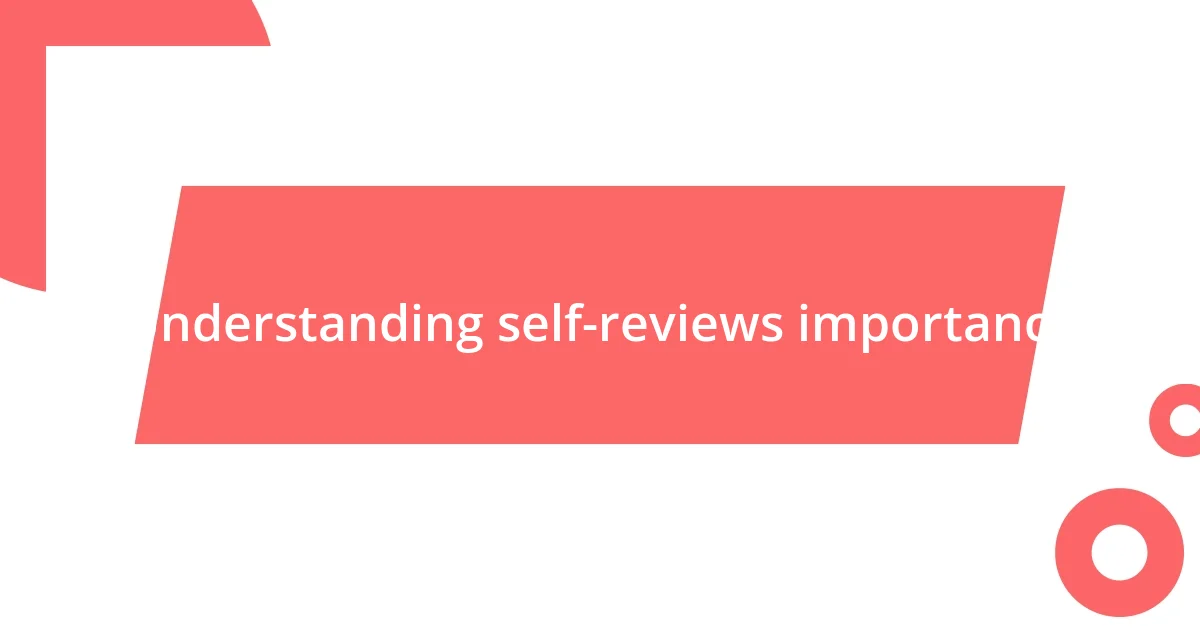
Understanding self-reviews importance
Self-reviews play a pivotal role in personal development, often revealing blind spots that we might otherwise overlook. I remember the first time I sat down to write a self-review; it felt daunting. But as I articulated my thoughts, I uncovered patterns in my work that helped me understand my strengths and areas for improvement. Isn’t it fascinating how reflecting on our own experiences can lead to such powerful insights?
In my experience, self-reviews foster a deeper connection between our daily activities and our long-term goals. When I take the time to evaluate myself, I find clarity in what truly matters. Honestly, it feels rewarding to acknowledge small victories along the way; those moments where I pushed through challenges are often the most enlightening. Have you ever noticed how those little triumphs can inspire greater motivation?
Moreover, self-reviews can significantly enhance our communication during performance evaluations. I remember a particularly tense meeting with my manager where discussing my self-review made it easier to present my progress and aspirations. It’s almost as if having that structured reflection prepared me for the dialogue ahead. Don’t you think being proactive about our achievements can make us more assertive and confident?
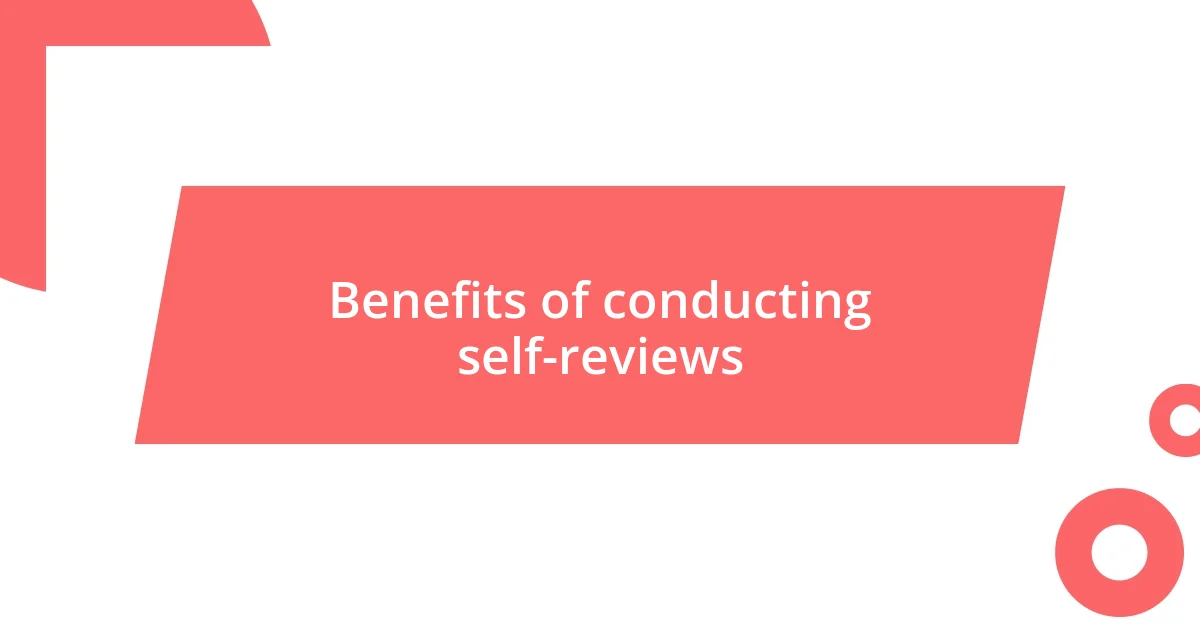
Benefits of conducting self-reviews
Conducting self-reviews opens doors to genuine self-discovery. Reflecting on my achievements tends to spark a mix of pride and motivation within me. Once, while reviewing my contributions to a project, I realized I had underestimated the impact of my collaborative efforts. Recognizing that I played a crucial role in fostering teamwork made me more mindful in future collaborations. It’s incredible how self-review can transform our perception of our value in a team.
Here are some benefits I’ve experienced through self-reviews:
- Increased Self-Awareness: Gaining clarity on my strengths and weaknesses has propelled my personal growth.
- Goal Alignment: I often find that self-reflection helps align my daily tasks with my long-term aspirations.
- Confidence Boost: Celebrating my wins through self-reviews always leaves me with a renewed sense of confidence.
- Enhanced Communication: When it’s time to discuss performance with others, I feel more prepared and articulate, having already reflected.
- Continuous Improvement: Each self-review allows me to identify new areas for growth, setting a positive cycle of improvement in motion.
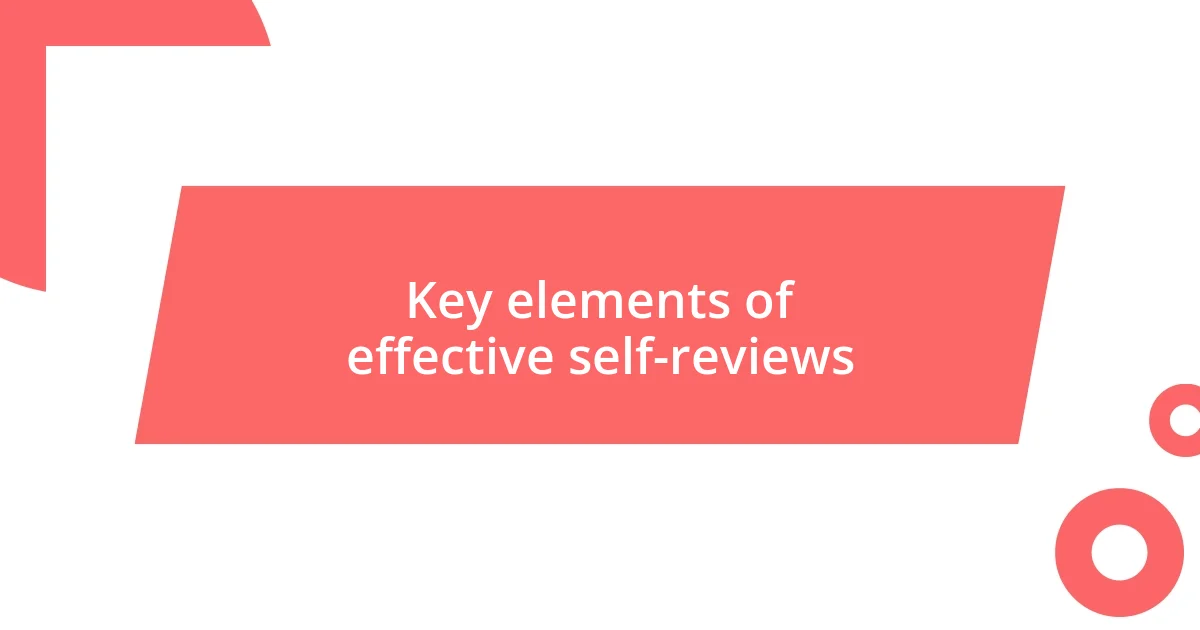
Key elements of effective self-reviews
When I think about the key elements of effective self-reviews, a structured approach comes to mind. First and foremost, I emphasize the importance of honest self-assessment. This means diving deep into my experiences and giving an unvarnished account of my performance. I once wrote a self-review that included some tough realizations about a project I could have managed better. However, facing those shortcomings head-on not only made me more accountable but also prompted me to develop specific strategies for improvement. It’s liberating to unearth those truths within ourselves.
Another crucial element is setting clear, measurable goals. Every time I engage in a self-review, I make it a point to articulate my objectives explicitly. For instance, after recognizing my tendency to procrastinate, I committed to deadlines that were both realistic and challenging. This focused approach not only provided direction but also allowed me to track my progress effectively and celebrate small wins along the way. Have you ever tried establishing concrete goals in your self-reviews? It can change the narrative from vague notions of improvement to tangible outcomes.
Lastly, the inclusion of constructive feedback from others can elevate self-reviews to an entirely new level. I remember soliciting input from a trusted colleague about my approach to teamwork. Their insights revealed perspectives I had simply missed, enriching my self-evaluation process. Blending external feedback with self-reflection transformed my understanding of my role in the team. It’s a powerful reminder that self-awareness isn’t just a solo journey; it often flourishes in collaboration.
| Key Elements | Description |
|---|---|
| Honest Self-Assessment | Diving deep into experiences to uncover truths about performance. |
| Clear, Measurable Goals | Setting specific objectives to track progress and celebrate achievements. |
| Constructive Feedback | Incorporating insights from others to enhance self-awareness and growth. |
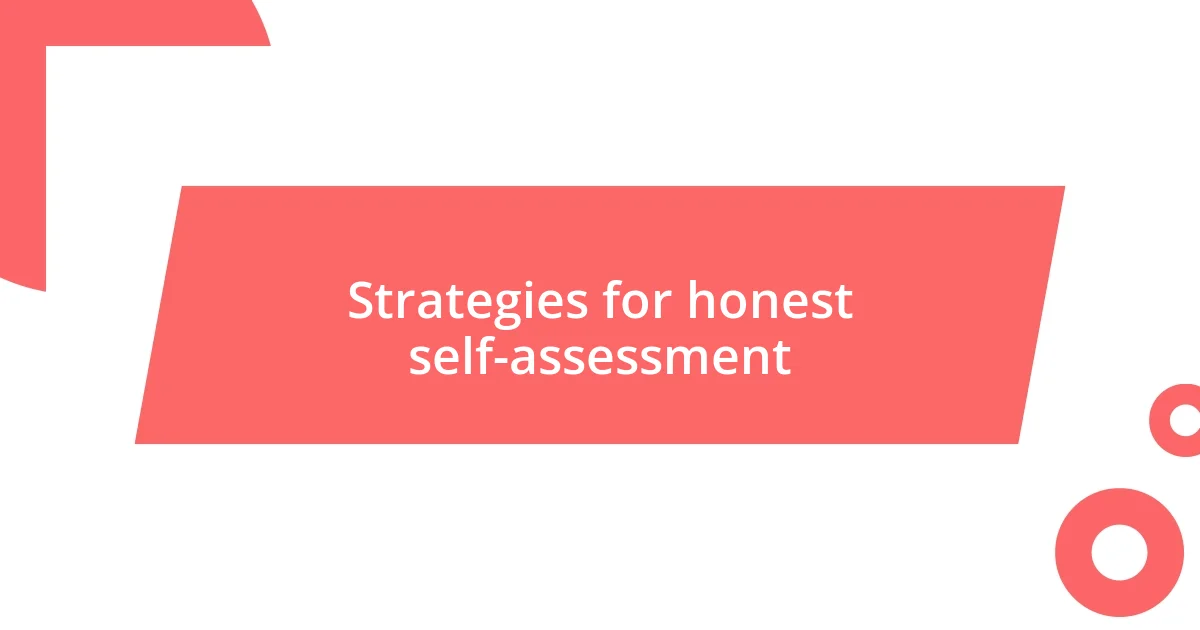
Strategies for honest self-assessment
One effective strategy for honest self-assessment is to maintain a regular journal of reflections. I started this practice a few years ago, and it has been eye-opening. Each entry allows me to unpack my thoughts about challenges and successes, creating a safe space for vulnerability. Have you ever really poured your heart out on paper? There’s something therapeutic about seeing your emotions laid bare, making it easier to confront the reality of your performance.
Another approach that has worked wonders for me is using self-evaluation frameworks or prompts. For example, I ask myself tough questions like, “What could I have done differently?” or “Did I truly value my team’s input?” This process forces me to examine my actions critically and, honestly, it can stir up feelings of discomfort, but it’s in that discomfort that growth often resides. In one reflective moment, I confronted a pattern of dismissing others’ ideas, and acknowledging that flaw helped me become a more inclusive team member.
Finally, I find it crucial to celebrate my progress, no matter how small. It’s easy to focus solely on what needs improving, but taking the time to recognize achievements creates a balanced perspective. After completing a challenging project, I looked back and noted not just the hurdles I overcame, but also the new skills I learned along the way. This simple act of acknowledgment made me feel accomplished and motivated me to keep pushing forward. Don’t you think that recognizing our hard-earned victories can fuel our journey toward even greater successes?
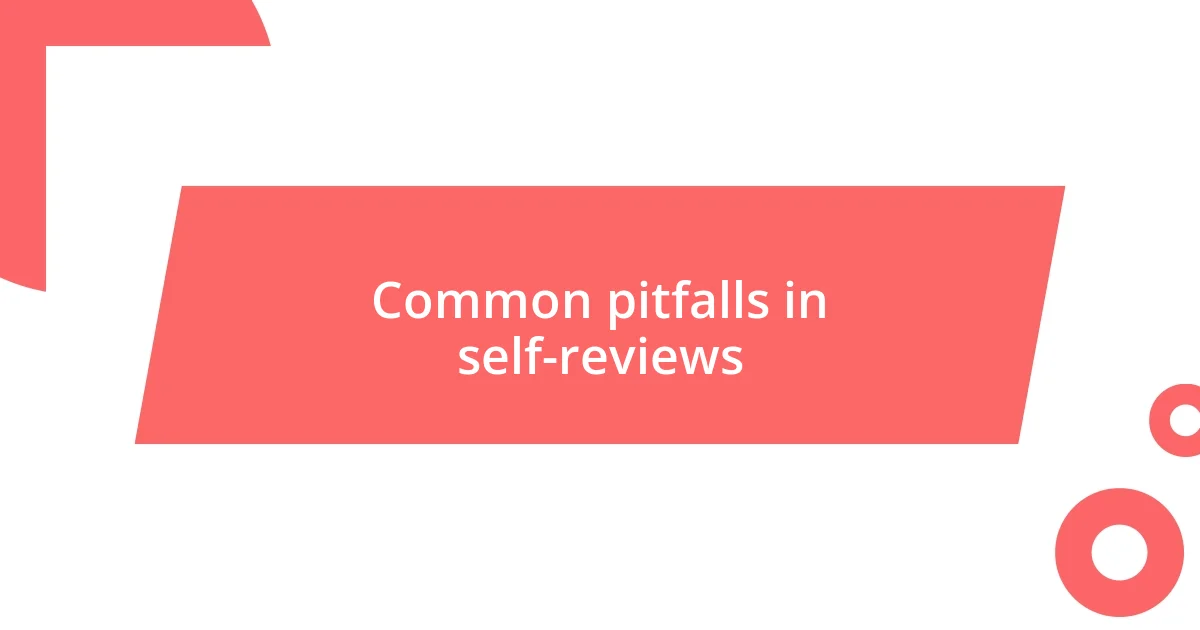
Common pitfalls in self-reviews
When I think about common pitfalls in self-reviews, one tendency stands out: the urge to overinflate achievements. It’s easy to paint a rosy picture of our performance, but glossing over shortcomings can hinder real progress. I once found myself in a meeting where I shared glowing reflections about a successful project, only to later realize that I had ignored several critical missteps. That moment hit hard; it drove home the point that honesty is not just a nicety—it’s a necessity for genuine improvement.
Another pitfall I’ve encountered is failing to align self-reviews with actual goals. I vividly remember a time when I wrote a self-review based on vague expectations rather than clear, measurable outcomes. The result? I felt lost and confused about my progress and future objectives. It was a wake-up call for me, underscoring the importance of ensuring my evaluations directly reflect the goals I’ve set. Have you ever felt similar frustration in your self-assessment process?
Additionally, the tendency to be overly influenced by others’ opinions can skew self-reviews. It’s crucial to balance external feedback with personal insights. I recall being swayed by a colleague’s critique that led me to underappreciate my strengths. That experience taught me a valuable lesson: while collaboration can enrich our understanding, relying solely on others can cloud our self-perception. I now strive to keep the focus on my personal journey while weaving in constructive feedback—it’s all about finding that sweet spot.
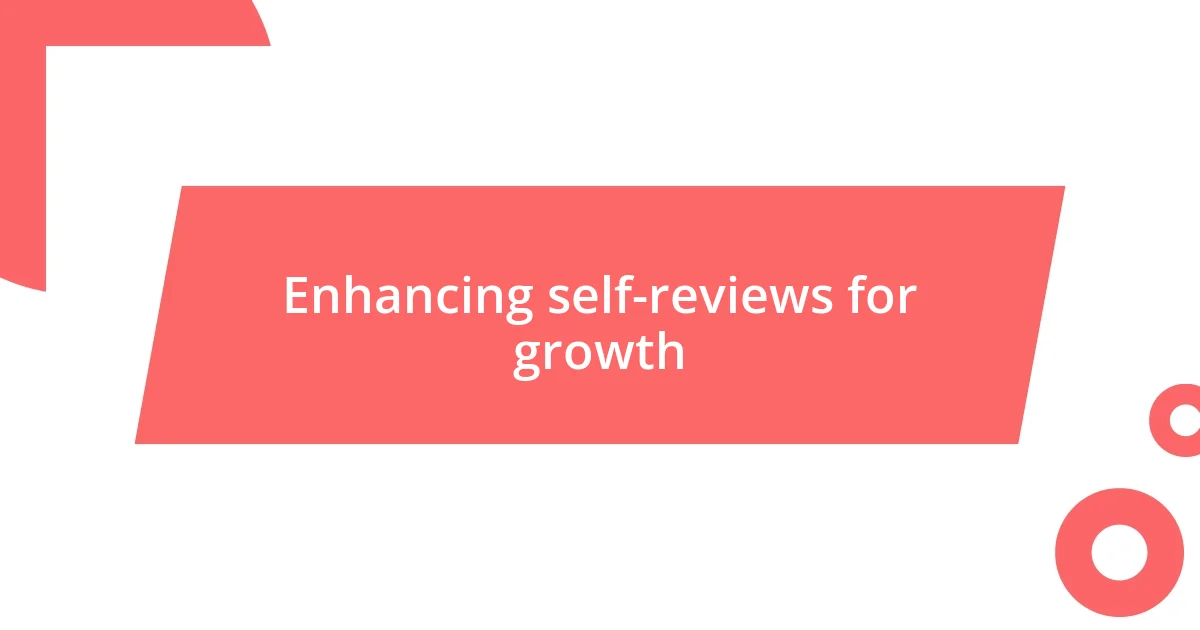
Enhancing self-reviews for growth
Enhancing self-reviews can truly be a transformative experience. For me, incorporating specific metrics into my evaluations was a game changer. By tracking my progress against defined goals, I could see not just where I excelled, but also where I needed to pivot. I remember setting measurable targets for a project, and when I reflected on my performance, it was illuminating to see how far off I strayed. Have you ever had a moment where numbers painted a clearer picture than words could?
Another approach I’ve found effective is seeking feedback from trusted colleagues before finalizing my self-review. One time, I sent a draft to a coworker who I respect, and their insights helped me see blind spots I hadn’t considered. While it felt a bit daunting to open up that draft for external eyes, it was well worth it. It turns out that a different perspective can reveal not just areas for improvement, but also strengths that I might have downplayed. How often do you seek outside opinions, and has it ever changed your view of your own contributions?
Finally, I make it a point to look back over previous reviews while crafting my current one. This practice not only reminds me of past lessons but also highlights my growth trajectory. I can distinctly recall reading an old self-review where I was grappling with time management. Fast forward to today, and I see how implementing techniques like the Pomodoro method has significantly shifted my productivity. By connecting the dots between my past and present, I feel a genuine sense of progress—do you ever reflect on how far you’ve come?
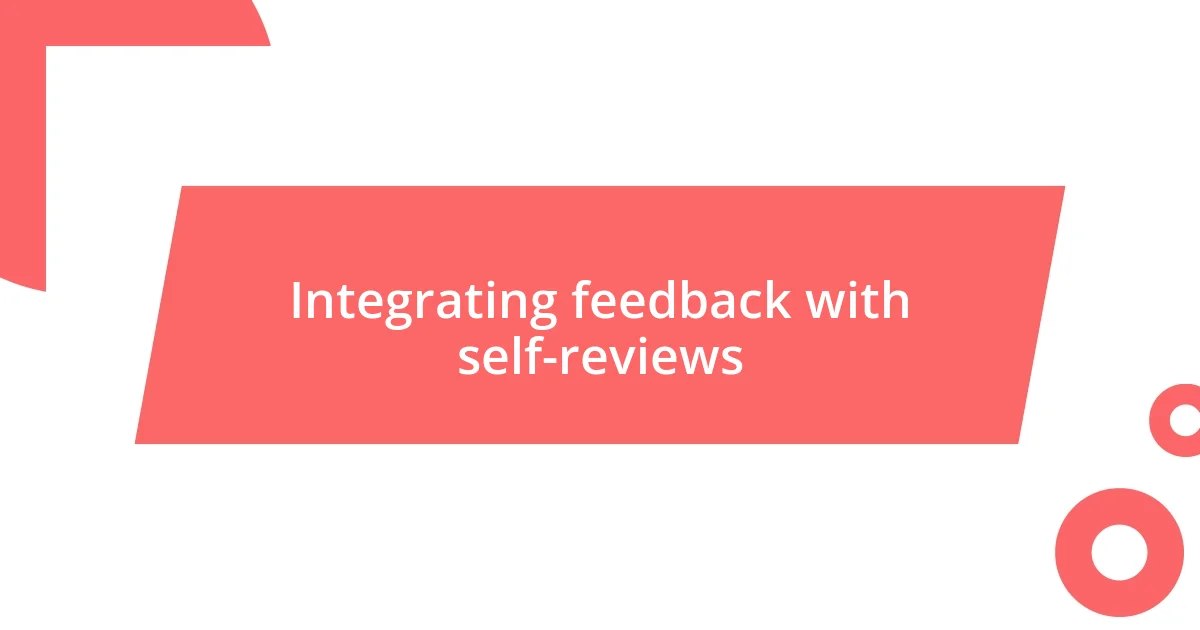
Integrating feedback with self-reviews
Integrating feedback into self-reviews can offer a richer, more nuanced view of our performance. I always find it enlightening to ask colleagues for their insights before submitting my final review. There was an instance where a coworker pointed out a pivotal moment in a project that I had completely overlooked. Their perspective not only helped me acknowledge my contributions but also gave me a better understanding of how my work fits within the team’s larger goals. How often do we inadvertently dismiss essential feedback that could elevate our self-assessment?
Additionally, I’ve learned to embrace both positive and critical feedback, using it to balance my self-perception. A while back, after receiving some constructive criticism during a performance review, I took the time to reflect on it in relation to my self-review. Initially, it stung, but as I revisited my self-assessment, I realized I needed to reconsider how I approached certain projects. That blend of personal reflection with external feedback facilitated an honest narrative of my journey. Do you really think we can grow if we only focus on our achievements without recognizing areas for improvement?
Ultimately, integrating feedback makes the self-review process less about a solitary reflection and more about a dynamic exchange of viewpoints. For me, I find that revisiting past feedback alongside my self-reflections creates a roadmap for growth. In one particular instance, I discovered that a recurring piece of feedback about my communication style had popped up again in my latest review. Instead of repeating the cycle of neglect, I chose to actively work on it—realizing that this was an ongoing journey rather than a one-off task. How do you think our past experiences can inform our current evaluations, and can they guide us toward becoming better professionals?














